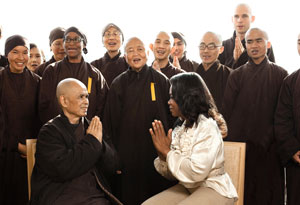Oprah Talks to Thich Nhat Hanh
The O Exclusive Interview

Photo: Rob Howard
He's been a Buddhist monk for more than 60 years, as well as a teacher, writer, and vocal opponent of war—a stance that left him exiled from his native Vietnam for four decades. Now the man Martin Luther King Jr. called "an apostle of peace and nonviolence" reflects on the beauty of the present moment, being grateful for every breath, and the freedom and happiness to be found in a simple cup of tea.
The moment I meet Thich Nhat Hanh at the Four Seasons Hotel in Manhattan, I feel his sense of calm. A deeply tranquil presence seems to surround the Zen Buddhist master. But beneath Nhat Hanh's serene demeanor is a courageous warrior. The 83-year-old native of Vietnam, who joined the monastery when he was 16, valiantly opposed his own government during the Vietnam War. Even as he embraced the contemplative life of a monk, the war confronted him with a choice: Should he remain hidden away in the monastery tending to matters of the spirit, or go out and help the villagers who were suffering? Nhat Hanh's decision to do both is what gave birth to "Engaged Buddhism"—a movement that involves peaceful activism for the purpose of social reform. It's also what led Martin Luther King Jr. to nominate him for a Nobel Peace Prize in 1967.
As part of his denunciation of the violence inflicted on his countrymen, Nhat Hanh founded a relief organization that rebuilt bombed Vietnamese villages, set up schools and medical centers, and resettled homeless families. Nhat Hanh also created a Buddhist university, a publishing house, and a peace activist magazine—all of which led the Vietnamese government to forbid him, in 1966, to return home after he'd left the country on a peace mission. He remained in exile for 39 years.
Before his exile, Nhat Hanh had spent time in the West (studying at Princeton and teaching at Columbia University in the early 1960s), and it was to the West that he now returned. Seeing an opportunity to spread Buddhist thought and encourage peaceful activism, he led the Buddhist Peace Delegation to the Paris Peace Talks in 1969, established the Unified Buddhist Church in France, and went on to write more than 100 books, including the 1995 best-seller Living Buddha, Living Christ—a volume that never leaves my nightstand.
Nhat Hanh eventually settled in Southern France and founded Plum Village, the Buddhist meditation practice center and monastery where he still lives. Thousands of people travel there each year to join him in exploring the tenets of Buddhism—including mindfulness (intentionally tuning in to the present moment), the development of a practice (a regular activity, such as mindful walking, that redirects you toward right thinking), and enlightenment (the liberation from suffering that comes when you wake up to the true nature of reality). These principles were introduced to the world more than 2,000 years ago by Siddhartha Gautama, or the Buddha, the Indian-born prince who left a life of ease and indulgence in order to seek enlightenment—and founded a religion along the way.
Thich Nhat Hanh—or, as his students call him, Thây, the Vietnamese word for "teacher"—brings along a group of Plum Village monks and nuns to listen in on our conversation. In some spiritual traditions, there is a concept called "holding the space"—or showing up as a compassionate listener. Thây's friends are the space holders who have traveled with him from France, and as we take a photograph together just before our chat, they usher in a peaceful mood by collectively singing a Buddhist song: "We are all the leaves of one tree; we are all the waves of one sea; the time has come for all to live as one."
Start reading Oprah's interview with Thich Nhat Hanh



